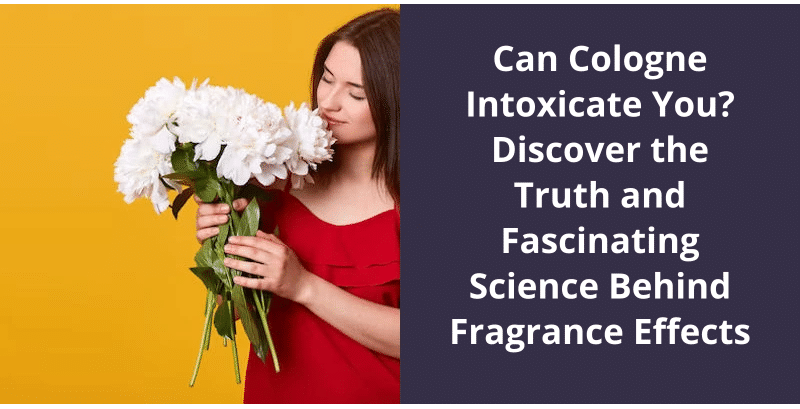Cologne, often adored for it’s alluring scents and ability to enhance personal style, holds a hidden potential that extends beyond mere olfactory pleasure. While it may seem inconceivable, the intoxicating power of cologne isn’t limited to it’s seductive charm but can actually manifest as a genuine threat to our well-being. Under certain circumstances, the excessive use or exposure to cologne can lead to a phenomenon known as cologne poisoning, a condition characterized by symptoms akin to drunkenness. However, the consequences of such poisoning extend far beyond mere inebriation, encompassing severe breathing difficulties, seizures, and even coma. It’s crucial to bear in mind that cologne poisoning isn’t to be taken lightly, as products containing high amounts of isopropyl alcohol, a common ingredient, can intensify it’s detrimental effects, further imperiling the health of unsuspecting individuals.

Can Cologne Get You High?
Cologne has long been associated with captivating scents and the power to enhance our personal appeal. However, amidst the allure and charm, some have wondered if cologne could potentially intoxicate and produce a high. The truth is, you can’t actually get high from wearing cologne. While it may evoke certain emotions or create a favorable impression, it doesn’t possess intoxicating properties.
Unlike inhalants that can be abused for their mind-altering effects, cologne predominantly contains alcohol, and in most cases, not even ethyl alcohol. It evaporates quickly upon application, leaving behind the desirable scent on the skin.
While cologne can’t intoxicate you, it certainly has the potential to influence your mood and emotions. The olfactory system, responsible for our sense of smell, is intricately connected to our brains limbic system, which controls emotions and memories. Certain scents can evoke strong emotions or trigger memories, providing a sensory experience beyond a simple fragrance.
It’s composition, primarily alcohol-based and devoid of psychoactive substances, doesn’t lend itself to such effects. So, indulge in your favorite scent, confident that it will intoxicate in the most pleasant and alluring way possible, without any risk of producing a high.
The Science Behind Scent and Emotion: Explore the Intricate Connection Between Our Sense of Smell and Our Emotions, Including How Certain Scents Can Evoke Specific Feelings or Trigger Memories.
Intriguing research has revealed a fascinating link between our sense of smell and emotions. Certain scents have the power to evoke specific feelings and even trigger vivid memories. Our olfactory system, responsible for detecting smells, is intricately connected to the parts of the brain that process emotions and memories. This connection explains why certain fragrances have the ability to transport us back in time or create a sense of calm or excitement. So, can cologne intoxicate you? While it may not have the same effect as alcohol, the science behind fragrance effects demonstrates that certain scents can indeed have a profound impact on our emotions.
In more serious cases, cologne ingestion can lead to life-threatening complications. Immediate medical attention is crucial to ensure a better outcome and prevent potential long-term consequences. Symptoms such as impaired motor skills, respiratory distress, seizures, and even loss of consciousness may occur. Therefore, it’s important to understand the risks involved and seek prompt treatment if cologne is accidentally consumed.
What Happens if I Get Cologne in My Mouth?
If someone accidentally gets cologne in their mouth, it’s important to address the situation promptly. The extent of the consequences will depend on the quantity of cologne ingested and the speed at which medical assistance is sought. Acting swiftly can significantly improve the likelihood of a successful recovery.
Consuming cologne can give the impression of intoxication, leading the individual to display characteristics typically associated with being drunk. This can include impaired coordination, altered speech patterns, and unsteady movements. However, the effects of cologne poisoning extend beyond mere impairment.
Severe breathing difficulties can arise as a result of ingesting cologne. The noxious chemicals present in the fragrance may irritate the respiratory system, hindering normal lung function. Additionally, individuals may experience seizures, which can further complicate the situation.
This heightened level of danger underscores the urgent need for immediate medical attention.
Symptoms may resemble intoxication, including impaired coordination and unsteady movements. It’s vital to seek medical attention promptly to maximize the chances of a successful recovery.
Source: Cologne poisoning Information | Mount Sinai – New York
Colognes have a unique composition that generally comprises a small percentage of pure perfume oil blended with a significant amount of alcohol and a small portion of water.
Does Cologne Contain Alcohol?
Colognes, known for their alluring scents, do indeed contain alcohol. This may come as a surprise to some, but it’s a key component in the majority of colognes available on the market. Typically, colognes contain approximately 3–5% perfume oil, which is what gives them their distinct fragrance. This perfume oil is then blended with a mixture of alcohol, usually comprising 80–90% of the total composition. Additionally, around 5–15% water is added to complete the formula.
The specific type of alcohol used in colognes is typically denatured alcohol, which has been treated to make it unsuitable for consumption. This is necessary to prevent any potential health hazards that may arise from consuming alcohol-based fragrances. Despite this, it’s worth noting that some individuals may still find themselves sensitive to the alcohol content in colognes, as it can potentially cause skin irritation or dryness.
How Alcohol Affects the Longevity and Projection of a Cologne’s Scent
Alcohol is often used as a base in colognes due to it’s ability to quickly evaporate and disperse the scent. However, the use of alcohol in fragrances can also affect the longevity and projection of a cologne’s scent. When applied to the skin, the alcohol in cologne evaporates rapidly, causing the initial burst of fragrance known as the top notes. These top notes tend to be noticeable for a short period of time before dissipating. Once the alcohol evaporates, the middle and base notes of the cologne, which are responsible for the overall scent and longevity, emerge and develop. However, the presence of alcohol can accelerate the evaporation of the fragrance molecules, resulting in a shorter duration and less projection of the scent. Therefore, while alcohol can help in the initial diffusion of a cologne’s scent, it may also contribute to a cologne’s faster dissipation.
Not only does cologne have the power to make someone more attractive, but it appears that the type of scent can play a crucial role in this enhancement. A staggering 97 percent of women find cologne sexy, particularly when it falls into the outdoorsy fragrance category. Scents with woody, aquatic, or citrusy notes seem to be particularly alluring to women. So, if you’re looking to up your attractiveness game, selecting a cologne with these characteristics might just do the trick.
Does Cologne Make Someone More Attractive?
When it comes to the question of whether cologne can actually make someone more attractive, it seems that the answer is a resounding yes. In fact, a whopping 97 percent of women find cologne to be undeniably sexy. However, it’s important to note that not all fragrances are created equal in terms of their attractiveness factor.
Interestingly, when the different scent families are broken down and analyzed, it becomes clear that women are particularly drawn to outdoorsy colognes. These scents, which often contain woody, aquatic, or citrusy notes, are deemed the sexiest by female respondents. So, if youre looking to up your attractiveness game, opting for a fragrance within these scent families could be a great choice.
But why exactly do certain colognes have such a powerful effect on our perception of attractiveness? The answer lies in the fascinating science behind fragrance and it’s impact on our senses. When we inhale a scent, it triggers a complex chain of reactions in our brains, ultimately influencing our emotions and even our behavior.
Of course, it’s important to remember that fragrance is a personal choice, and what may be attractive to one person may not be to another. Ultimately, it’s about finding a cologne that makes you feel confident and comfortable, as this inner self-assurance is often what truly makes someone attractive. So, whether you opt for an outdoorsy cologne or prefer a different scent profile, embrace the power of fragrance and enjoy the boost of allure it can bring.
The Popularity of Niche Fragrances Explore the Rise of Niche Cologne Brands and Their Appeal to Those Seeking Unique and Distinctive Scents.
- The growing trend of niche fragrances
- The rise of niche cologne brands
- Appeal to individuals seeking unique scents
- The distinctive characteristics of niche fragrances
- The exclusivity of niche cologne brands
- The emergence of artisanal perfume makers
- The exploration of rare and unusual ingredients
- The personalization options offered by niche fragrances
- The influence of social media on the popularity of niche colognes
- The niche fragrance community and it’s growing following
The allure of intoxicating perfume lies in it’s ability to evoke a powerful emotional response. Whether it’s the captivating scent of lilies or another enticing fragrance, the effect is undeniable. This literary adjective encompasses the ability of certain scents to create a sense of excitement and happiness, leaving an indelible impression on our senses.
What Does Intoxicating Perfume Mean?
When we talk about an intoxicating perfume, we refer to a scent that’s the power to evoke a strong emotional response, often leading to a sense of excitement or happiness. It’s a fragrance that captivates our senses and transports us to a different world, creating a whirlwind of emotions. Just like the aroma of lilies can be described as intoxicating, certain perfumes have the ability to intoxicate us on a sensory level.
The fascinating science behind fragrance effects reveals that the olfactory system, responsible for our sense of smell, is closely linked to our emotions and memories. When we inhale a specific scent, it triggers the limbic system in our brain, which is associated with emotions, long-term memory, and motivation.
It intertwines with our emotions, thoughts, and even physical sensations, resulting in a holistic effect. This is why some perfumes have the reputation of being sensual, seductive, or even addictive. The complex blend of notes in a perfume can interact with our body chemistry, creating a unique and personalized scent that truly intoxicates us.
The truth behind fragrance effects isn’t just limited to it’s emotional impact; it can also have physiological effects on our bodies. For example, the scent of lavender has been found to induce relaxation and reduce stress, while citrus scents can uplift our mood and increase alertness. These effects further contribute to the intoxicating nature of perfumes and the profound impact they’ve on our overall well-being.
Conclusion
It’s important to be cautious when using cologne and to follow the recommended guidelines in order to avoid any potential health risks. Additionally, products with high levels of isopropyl alcohol should be used with extreme caution, as they’ve the potential to cause more serious illnesses.





